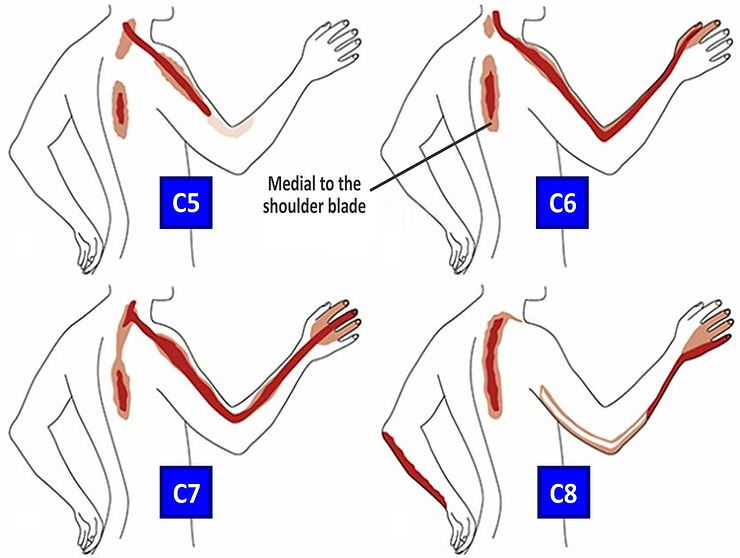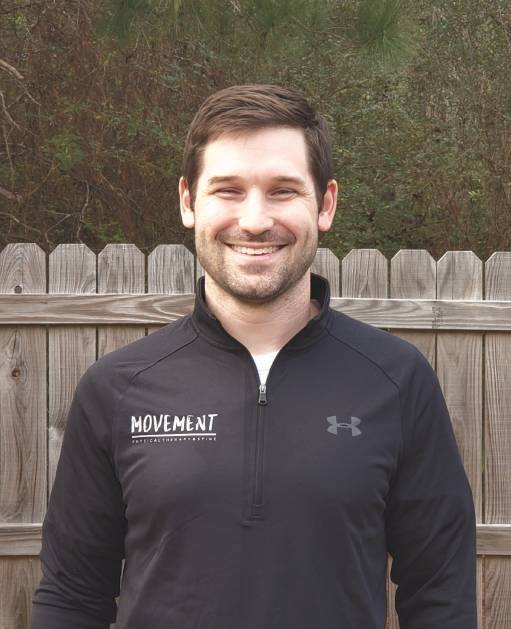The term “cervical radiculopathy” is a diagnosis that means that a cervical nerve root is being inflamed, pinched, or irritated as it exits the spine before it moves into the shoulder, arm, and hand.
Today we’ll discuss what causes cervical radiculopathy and what your options are for treatment–including whether or not physical therapy could be your solution.
Symptoms?
Most people with this condition will complain of tingling, numbness, or burning into the shoulder, arm, and/or hand. Symptoms should only be present on one side of the body. If symptoms are present in both arms it’s indicative that something more serious is occurring and you should seek immediate medical attention from your doctor.
Tingling, numbness, and burning sensations are telling signs that a nerve is being irritated. If there is muscle weakness present it’s a sign the nerve is being compressed. Weakness is a clue that something more severe is occurring which should be addressed sooner rather than later as it can lead to permanent and irreversible damage.
Because the nerve exits the cervical spine as it traverses down the arm and into the hand, these symptoms can present anywhere throughout the arm. Some people will feel tingling, numbness, or burning into the hand while others will only feel it into the upper arm.
The above image shows how the associated symptoms will be present in different areas of the arm and hand depending on which nerve is being compressed or irritated in the neck.
Causes?
As previously mentioned, a cervical radiculopathy is caused by an inflamed, pinched, or irritated cervical nerve. With that said, there are many underlying causes for this problem.
Most people will be told their symptoms are a result of:
1. Herniated Disc and/or Bulging Disc
Because the cervical nerves exit the spine a herniated disc or bulging disc can impede their line of travel. When a herniated or bulging disc is present it can press on the nerve which then causes cervical radiculopathy symptoms. However, many people who have nerve symptoms and a herniated or bulging disc don’t require surgery.
It’s important for you to know that science has proven that a majority of people found to have a herniated/bulging disc report no associate pain. If you’ve been diagnosed with a herniated or bulging disc please see the “differential diagnosis” section below. Most people can overcome the pain without meds, surgery, or injections.
2. Pinched Nerve
A pinched nerve can become pinched anywhere along its path. You can have a pinched nerve in the neck, first rib, pec minor muscle (at the shoulder), at the cubital tunnel (at the elbow), or at the carpal tunnel (at the wrist).
Finding a movement expert, such as a specialized physical therapist, can help determine which of the areas is the root cause of the pinched nerve.
3. Degenerative Disc Disease
Degenerative disc disease occurs when the disc between the vertebrae becomes smaller over time. This has been shown to be part of the natural aging process, as common as gray hair. However, if the disc becomes severely degenerated the spine can pinch the nerve as it exits the vertebrae.
If this is truly the cause of cervical radiculopathy you should feel symptoms in both arms. If you only complain of symptoms into one arm then this is almost certainly not the cause (even if you’ve been told it is).
4. Spinal Stenosis
Spinal stenosis is a term that means that there is narrowing in the spine. This is a bit of a broad term, as narrowing can occur at various locations in the spine. Stenosis will only be symptomatic when occurring to the degree that that it is compressing the nerve as it exits the spinal canal.
Lateral recess stenosis (if symptomatic) will be felt only into one arm/hand while central canal stenosis (if symptomatic) will be felt into both arms/hands.
Exploring Other Potential Causes…
Here are some other causes of pain, tingling, numbness, or burning into the arm and/or hands that are much less commonly diagnosed but may actually be the true source of your symptoms.
1. Referred Pain From the Rotator Cuff
Referred pain is something we see frequently at our physical therapy clinic in Huntersville, NC. Referred pain occurs when the location of perceived pain is different from the true source of the issue.
A common example of referred pain is when pain is felt in the left arm as a sign of potential heart attack. In this case, the referred pain (felt in the arm) is in a different location from the true source of the issue (the heart).
Determining whether your pain is being referred from the rotator cuff can be verified via a simple test in our office. When this is the source, by lightly pressing on the rotator cuff muscles and waiting for 2-3 minutes, you will feel a slight sensation (typically tingling, numbness, or burning) into their arm and/or hand.
2. Nerve Tension
When the nerve is compromised like it is with cervical radiculopathy symptoms we need to rule out the possibility of the nerve want wanting to accept load.
A healthy nerve should be able to be stretched and not become tight and/or painful. When the nerve is unable to do so it is considered to have nerve tension.
There are 3 main branches of nerves throughout the upper limb (median, ulnar, and radial nerves). There are simple tests that place these nerves on a stretch. If the patient complains of pain, tightness, or nerve symptoms this is indicative of a positive test and should be treated.
3. Stiff Cervical Spine
Many times pain and nerve symptoms are a sign that the body feels threatened with one or more movements. A stiff cervical spine is extremely likely to be present in people who suffer from cervical radiculopathy symptoms.
We have found that cervical extension (looking up) and cervical rotation (to the painful side) are the most likely to be problematic. A stiff cervical spine should be addressed as it can very likely be the cause of the symptoms.
Cervical Radiculopathy Treatment
As you can see by now there are many different causes for tingling, numbness, or burning into the arms and/or hands. A thorough assessment of the neck, shoulder, elbow, wrist, and fingers should be completed by a Doctor of Physical Therapy specialized in these conditions.
From our experience, nearly everyone with cervical radiculopathy can avoid surgery and pain meds with the right treatment approach and physical therapist. If you’re suffering from this problem and are interested in our services in Huntersville, NC, we invite you click one of the links below to connect with us.
~ Dr. Dallin Page


